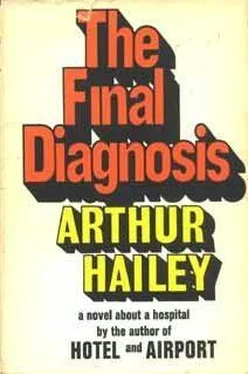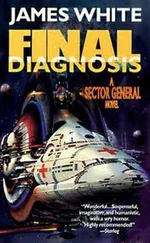Arthur Hailey - The Final Diagnosis
Здесь есть возможность читать онлайн «Arthur Hailey - The Final Diagnosis» весь текст электронной книги совершенно бесплатно (целиком полную версию без сокращений). В некоторых случаях можно слушать аудио, скачать через торрент в формате fb2 и присутствует краткое содержание. Жанр: Триллер, на английском языке. Описание произведения, (предисловие) а так же отзывы посетителей доступны на портале библиотеки ЛибКат.
- Название:The Final Diagnosis
- Автор:
- Жанр:
- Год:неизвестен
- ISBN:нет данных
- Рейтинг книги:4 / 5. Голосов: 1
-
Избранное:Добавить в избранное
- Отзывы:
-
Ваша оценка:
- 80
- 1
- 2
- 3
- 4
- 5
The Final Diagnosis: краткое содержание, описание и аннотация
Предлагаем к чтению аннотацию, описание, краткое содержание или предисловие (зависит от того, что написал сам автор книги «The Final Diagnosis»). Если вы не нашли необходимую информацию о книге — напишите в комментариях, мы постараемся отыскать её.
The Final Diagnosis — читать онлайн бесплатно полную книгу (весь текст) целиком
Ниже представлен текст книги, разбитый по страницам. Система сохранения места последней прочитанной страницы, позволяет с удобством читать онлайн бесплатно книгу «The Final Diagnosis», без необходимости каждый раз заново искать на чём Вы остановились. Поставьте закладку, и сможете в любой момент перейти на страницу, на которой закончили чтение.
Интервал:
Закладка:
David Coleman was surprised to see the chief of surgery—tall, bronzed, standing out from the crowd—waiting for him with outstretched hand. O’Donnell said, “It’s good to see you. Joe Pearson couldn’t make it, but we thought that someone should be around to say ‘welcome.’ ” What O’Donnell failed to add was that Joe Pearson had flatly refused to go and, Harry Tomaselli being out of town, O’Donnell had taken the time to drive out himself.
As they moved through the hot, crowded lobby O’Donnell saw Coleman glance around him. He got the impression that the younger man was making a quick assessment of his surroundings. Perhaps it was a habit—if so, a good one. Certainly David Coleman would stand up to scrutiny himself. Though he had had a three-hour air journey, his gabardine suit was uncreased, his well-trimmed hair carefully parted and brushed, his shave recent. He wore no hat, which made him look younger than his thirty-one years. Though slighter than O’Donnell in build, his features were clear-cut and well defined; he had a longish face and an incisive jaw. The brief case under his arm added a professional touch; picture of a young scientist, O’Donnell thought. He steered Coleman toward the baggage counter. A trailerload of bags was being unloaded, and they joined the scrimmage with other passengers who had disembarked.
O’Donnell said, “This is the part of air travel I dislike.”
Coleman nodded and smiled faintly. It was almost as if he had said, Let’s not waste our talents on small talk, shall we?
This is a cool customer, O’Donnell thought. He noticed, as he had at their previous meeting, the steel-gray eyes and wondered what it took to penetrate behind them. Now Coleman was standing, unmoving among the crowd, glancing around. Almost as if by command, ignoring others, a redcap gravitated toward him.
Ten minutes later, as O’Donnell threaded his Buick through the airport traffic and headed toward town, he said, “We’ve put you up in the Roosevelt Hotel. It’s as comfortable as any and quiet. I believe our administrator wrote you about the apartment situation.”
“Yes, he did,” Coleman said. “I’d like to do something about that quite quickly.”
“You won’t have any problem,” O’Donnell said, then added, “Perhaps you’d like to take a day or two to fix up an apartment before you report at the hospital.”
“I don’t think so, thank you. I plan to start work tomorrow morning.”
Coleman was polite but definite. O’Donnell thought: This is a man who makes up his mind, then states his opinion plainly. He sounded, too, as if he were not dissuaded easily. O’Donnell found himself speculating on how Joe Pearson and David Coleman were going to get along. Superficially it looked as if they might clash. But you could never tell. Sometimes in a hospital the most unlikely people hit it off like lifetime friends.
Looking around him as they drove through the approaches to the city, David Coleman found himself close to a sense of excitement at the prospect ahead. This was unusual because mostly he took whatever came with a matter-of-fact acceptance. But it was, after all, his first staff appointment to a hospital. He told himself: a touch of down-to-earth humanity is nothing to be ashamed of, my friend, then smiled inwardly at the silent self-criticism. Old habits of thought, he reflected, were hard to break.
He wondered about O’Donnell, sitting beside him. Everything he had heard about the chief of surgery at Three Counties had been good. How was it, he wondered, that a man with O’Donnell’s background and qualifications would choose a place like Burlington? Did he, too, have a mixed-up motivation, or was there some other reason? Maybe he just liked it here. There were some people, Coleman supposed, whose preferences were straightforward and uncomplicated.
O’Donnell pulled out to pass a tractor-trailer. Then he said, “I’d like to tell you a couple of things, if I may.”
Coleman said politely, “Please do.”
“We’ve had a number of changes at Three Counties these past few years.” O’Donnell was going slowly, choosing his words. “Harry Tomaselli told me you’d heard of some of them—as well as our plans.”
Coleman smiled. “Yes, I had.”
O’Donnell sounded his horn and a car ahead of them moved over. He said, “The fact of your being here represents a major change, and I imagine that, once installed, there will be other changes you’ll want to make yourself.”
Coleman thought of the hospital’s pathology department as he had seen it during his brief visit. “Yes,” he responded, “I’m sure there will.”
O’Donnell was silent. Then, more slowly, he said, “Whenever we could, we’ve tried to make our changes peaceably. Sometimes that hasn’t been possible; I’m not one who believes in sacrificing a principle just to keep the peace.” He looked sideways at Coleman. “Let’s be clear about that.”
Coleman nodded but made no answer. O’Donnell went on, “All the same, wherever you can, I’d suggest you move discreetly.” He smiled. “Do what you can by persuasion, and save the big guns for things that really matter.”
Noncommittally Coleman said, “I see.” He was not sure just what he was being told; he would need to know O’Donnell better before deciding that. Had he been wrong in his impression of O’Donnell? Was the chief of surgery, after all, just a pussyfooter? Was Coleman being told here and now, as a newcomer, not to rock the boat? If that were so, they would quickly find they had obtained the wrong man. David Coleman made a mental note not to take a long lease on any apartment he might find in Burlington.
O’Donnell was wondering now if he had been wise in saying what he had. They had been fortunate to get this man Coleman, and he had no wish to put him off, not right at the beginning. But all the time at the back of O’Donnell’s mind had been the problem of Joe Pearson and Pearson’s admitted influence with Eustace Swayne. As far as he could O’Donnell wanted to be loyal to Orden Brown; in the past the board chairman had done a good deal to support the chief of surgery. O’Donnell knew that Brown wanted Swayne’s quarter million dollars and, indeed, the hospital needed it badly. And if that meant placating Joe Pearson a little, O’Donnell was prepared to go along—within reason.
But where did hospital politics end and O’Donnell’s responsibility as a medical practitioner begin? It was a question that troubled him; someday he might have to decide just where the line of demarcation lay. Was he himself playing politics now? O’Donnell supposed he was. If he were not, he would not have just said what he had to Dr. Coleman. Power corrupts, he thought; you can’t escape it, no matter who you are. He considered expanding the subject a little more with Coleman, perhaps taking the younger man into his confidence, then decided against it. Coleman was, after all, a newcomer; and O’Donnell was acutely aware that he had not penetrated yet behind those cool gray eyes.
Now they were coming into the city center, the streets of Burlington hot and dusty, sidewalks shimmering and the black-top roadways sticky in the heat. He turned the Buick into the forecourt of the Roosevelt Hotel. A porter opened the car doors and began to remove Coleman’s bags from the rear seat.
O’Donnell said, “Would you like me to come in? Make sure everything’s in order?”
From outside the car Coleman answered, “There’s really no need.” Once more the quiet but definite statement.
O’Donnell leaned across the seat. “All right. We’ll expect you tomorrow then. Good luck.”
“Thank you.”
The porter slammed the doors, and O’Donnell eased the car into the city traffic. He glanced at his watch. It was 2 p.m. He decided he would go to his own office first, the hospital later.
Читать дальшеИнтервал:
Закладка:
Похожие книги на «The Final Diagnosis»
Представляем Вашему вниманию похожие книги на «The Final Diagnosis» списком для выбора. Мы отобрали схожую по названию и смыслу литературу в надежде предоставить читателям больше вариантов отыскать новые, интересные, ещё непрочитанные произведения.
Обсуждение, отзывы о книге «The Final Diagnosis» и просто собственные мнения читателей. Оставьте ваши комментарии, напишите, что Вы думаете о произведении, его смысле или главных героях. Укажите что конкретно понравилось, а что нет, и почему Вы так считаете.












